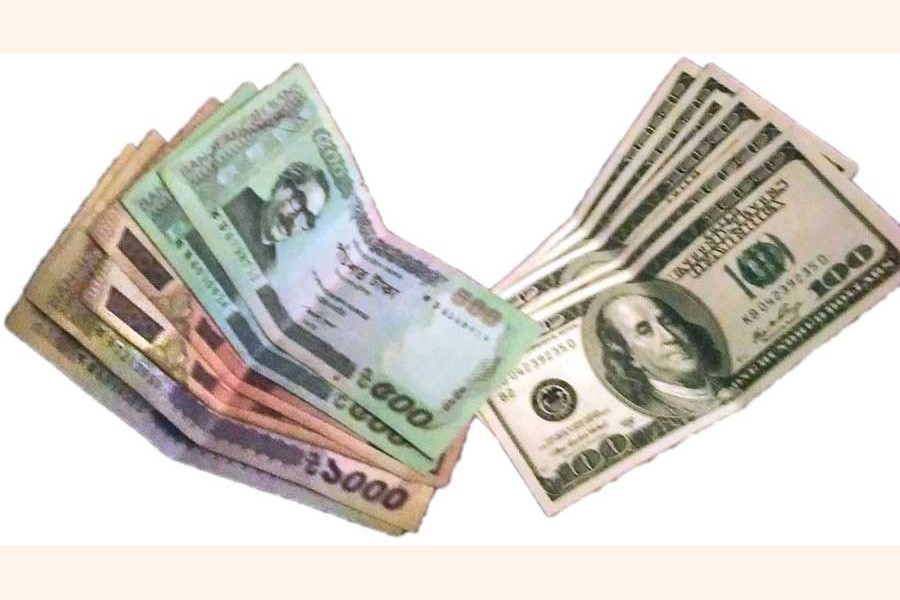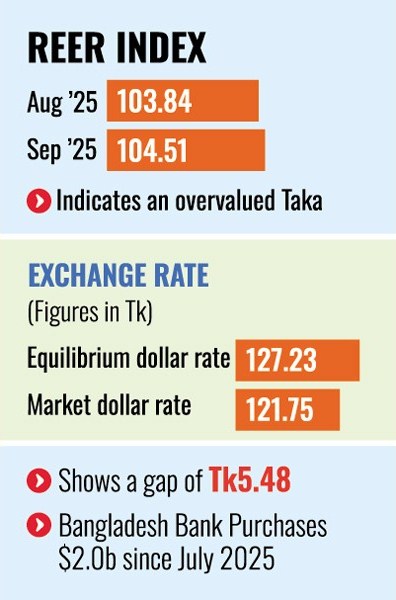Taka seen overvalued as dollar gap widens
Strong local currency raises worries over export edge

Published :
Updated :

The local currency, Taka, appears increasingly overvalued as sluggish import demand, weak private-sector credit growth, and robust remittance inflows continue to shape foreign exchange dynamics.
Bangladesh Bank's latest data show the real effective exchange rate (REER) climbed to 104.51 in September from 103.84 a month earlier, signalling that the Taka remains stronger than its equilibrium level.
Economists warn that the overvaluation could erode export competitiveness and disrupt the country's external balance if left unaddressed.
A key gauge of currency valuation against a basket of 15 major trading partners, covering more than 80 per cent of Bangladesh's trade, the REER indicates that the Taka is stronger than its equilibrium value.
A REER below 100 typically signals improved export competitiveness, while a reading above 100 points to a stronger domestic currency that makes exports less attractive and imports cheaper.
Based on the September 2025 reading, the dollar's equilibrium rate should be around Tk127.23. Instead, it traded at Tk121.75, suggesting the Taka was overvalued by about Tk5.48, according to Bangladesh Bank data released on Thursday.

People familiar with the matter said the central bank has been purchasing dollars to help narrow the gap with the greenback.
"We're rightly buying dollars; otherwise, the difference would have been wider," a senior central banker told The Financial Express on Thursday.
Since July, the central bank has bought US$2.0 billion through multiple market operations. Officials noted that weak private-sector credit growth has limited import demand, keeping foreign exchange inflows steady.
Private-sector credit expanded by only 6.35 per cent year-on-year in August 2025, Bangladesh Bank data show.
"Bangladesh has adequate dollar inflows. We will continue buying to minimise the gap, but there will be no direct intervention in the market," the banker added.
Economists caution that the overvaluation poses risks to the country's trade competitiveness, particularly for exporters.
"This is having a negative impact on export earnings," said Dr M. Masrur Reaz, Chairman and CEO of Policy Exchange Bangladesh.
"We enjoyed a favourable position in recent months, but the situation is now becoming volatile."
He added that a rising REER also pushes domestic inflation higher relative to that of Bangladesh's trading partners.
"After the general election, import demand will rebound, and private-sector activity, the real engine of the economy, will accelerate," Dr Reaz observed.
Bangladesh Bank's Chief Economist Dr Akhtar Hossain noted that the current import slowdown mirrors weak private investment trends.
"Once private investment gains momentum, import demand will rise, and currency equilibrium can be restored," he said.
Dr Hossain also underscored the importance of attracting foreign direct investment (FDI) to balance savings and investment flows.
He noted that gross national savings and total investment have remained stagnant at around 29 per cent of GDP for years, suggesting that higher FDI is essential for sustaining economic growth.
"We are desperately seeking FDI, and such investment will accelerate growth," he added.
According to Dr Hossain, the ample inflow of foreign exchange, particularly from expatriate workers, has contributed to the Taka's appreciation.
Remittance inflows reached US$30.0 billion in FY2025, marking a 27 per cent year-on-year increase, according to the central bank's data.
jasimharoon@yahoo.com


 For all latest news, follow The Financial Express Google News channel.
For all latest news, follow The Financial Express Google News channel.